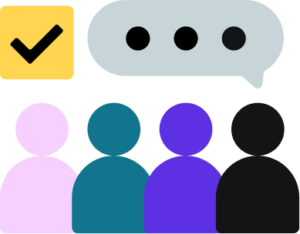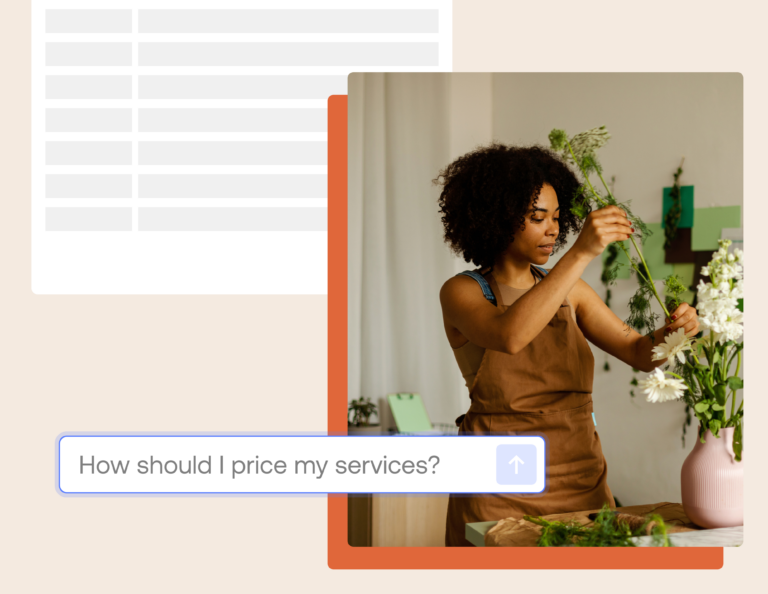Customer relationship management software helps businesses organize their data, streamline interactions, and improve customer relationships, thereby boosting sales. This post outlines best practices to help you choose the right CRM for your business.

It’s the moment you’ve been waiting for. Clients are pouring in, and your revenue is shooting past the year’s projections. Instead of feeling like you struck it rich, though, you’re wondering how you’ll be able to effectively manage all your clients (and whether you’ll ever find time to take a day off).
Fortunately — as is true in so many areas of life and business — you can lean on technology to lessen your workload and better organize everything. So celebrate your wins and fearlessly take on more clients; customer relationship management (CRM) software helps you cover more ground without losing the human touch that got you to where you are today.
Keep reading to learn what CRM systems are, how you can use one to scale your business, and how to choose a CRM solution that’s right for you.
Jump to:
- What are the benefits of a CRM system?
- What is small-business CRM?
- Choosing the right CRM solution starts with identifying your business’s requirements and challenges
- Think strategically, plan for the future
- Determine your budget
- Research and compare CRM solutions
- Common mistakes to avoid when choosing a CRM system for your small business
- What are the 3 types of CRM systems?
- The value of a CRM solution for small businesses

Capture leads, convert, and provide an excellent experience with HoneyBook. Go beyond a standard CRM.
What are the benefits of a CRM system?
A CRM tool is a saving grace for small business owners who need to organize, manage, and leverage customer information.
CRM solutions like HoneyBook include AI, automation, and a ton of other useful features that can save you time and put you back in control of your client relationships.
Here are a few ways a CRM system will take your client experience to the next level:
- It improves your customer service: Because a CRM system organizes all of your client data in one place, you can easily access it at any time and use the information stored within it to give each client a tailored customer service experience.
- It helps with client retention: When customers are happy with your service, they’ll stay with you for longer periods of time, and your retention rates will shoot through the roof.
- It gathers important client data: You can store every small piece of information about your customers — like their preferences, previous issues, addresses, phone numbers, and more — in one location.
- It boosts productivity: CRM tools like HoneyBook have automation features that handle repetitive tasks for you, so your productivity skyrockets.
While your business can find these benefits in almost any CRM system, some platforms are specifically designed for small businesses like yours.
What is small-business CRM?
General CRM solutions are usually built for larger corporations with a full IT staff that can manage complex software.
Small-business CRM systems, on the other hand, are easier to use and process smaller amounts of data so you won’t get overwhelmed. You don’t need a dedicated employee just to manage the tool; you can handle all the information and run your software from day to day.
HoneyBook’s CRM solution gives you everything you need to manage your client relationships, and it’s easy for anyone to use (even those without a technical background). HoneyBook stands apart from other CRM solutions because it combines booking and invoicing with other important features, like lead capture, project management, and client communication. We support you through the entire client workflow.
Choosing the right CRM solution starts with identifying your business’s requirements and challenges
Choosing a CRM system is much like choosing the right logo for your business. There’s technically no wrong choice, but you want to match your selection with your business’s needs, objectives, and operational style.
Here are a few guiding principles we recommend you use to determine which CRM system is the best fit for your company.
Assess your current processes
Take a close look at your current approach to client management and identify areas that are bottlenecking your progress and slowing you down.
Use these questions to guide you:
- Are you struggling with tracking client interactions?
- Do you face challenges in streamlining your invoicing and payment processes?
- Do you have problems booking clients at the right times?
Getting specific on your major problems will help you find features that will directly address those issues.
Identify and prioritize essential features
Armed with important insights about your main bottlenecks, you can seek out must-have features.
Open up a dialogue with your clients, and ask them questions about your service. Your aim is to find the two or three most common issues clients are experiencing. You can also look to other businesses in your industry to see what they’re doing and how they’re deepening relationships with their own clients.
Use all of this information to compile a list of CRM features that will help solve your problems.
8 essential questions to address when choosing a CRM system
To make your selection process easier, we’ve broken down your decision into eight questions you need to ask yourself:
- What are the most inefficient processes at your company?
- What operational processes and workflows need to be added?
- Which resources do you need more of?
- Are there any manual tasks you’d like to automate?
- What’s the most common issue you face with customers?
- How is your communication with customers, and between departments?
- Which daily activities give you the most stress?
- Which daily activities give you the best return on investment?
Think strategically, plan for the future
Beyond addressing your initial problem areas, your CRM provider needs to be your partner for the foreseeable future. This means you want to think strategically and plan for the future. As your company grows, so will your operations. Your CRM system needs to be flexible enough to adapt and scale with your business.
What about industry-specific needs, like online meeting room integration or a retainer-based payment system? Will your CRM be able to handle these needs as your company expands and evolves?
Determine your budget
Another factor you can’t move forward without considering is your overall budget for a CRM solution. Luckily, CRM platforms offer different pricing options — such as subscription-based models, one-time fee setups, and freemium plans — to help you get exactly what you need.
Many small businesses forget to factor in the additional costs associated with selecting a CRM system. You’ll need to budget for implementation, initial employee training, and ongoing maintenance costs.
You should also look for options like free trials and money-back guarantees so you can try out different CRM tools without breaking the bank.
Research and compare CRM solutions
You’ve done all the research; now you’re ready to start looking at CRM solutions and comparing your options. Here are some proven strategies for differentiating between a good CRM solution from one that won’t benefit your business.
Is the CRM solution designed to meet the needs of small businesses?
Even with the fanciest bells and whistles, your tool won’t do you any favors if it isn’t addressing your specific needs.
Here are a few features a small-business CRM solution needs to have:
- Customizable contact management
- Automated invoicing
- Integration with your software programs
- Mobile accessibility
- Affordable pricing options
When comparing your options, make sure that the CRM system you select has features that address your business’s problem areas.
What is the scalability of the CRM system?
No matter what size your business is right now, chances are that you hope to expand your operations in the future. Because of this, you need a scalable CRM solution that can handle increasing amounts of customer data, employees, and revenue without causing disruptions.
What types of security features are built into the application?
Collecting sensitive information about your clients means you need to be diligent about protecting that data. Different regions have different (mandatory) data security regulations, but the right software system can handle that for you.
Make sure the CRM solution you pick has data encryption and user authentication to provide extra security. Also, check if your provider is running its own security updates to protect against potential breaches.
Assess the CRM system’s integration capabilities
Can you imagine spending money on expensive software, taking the time to implement it into your system, and then finding out it doesn’t even work with your other tools? When selecting a CRM system, you need to make sure it can integrate with your other systems before moving forward.
Most CRM solutions have at least some integrations with other tools. Still, the best ones will sync your financial, operational, and customer data with your entire system.
What reporting tools are included?
Today’s world is run by data, and you don’t want to be left behind. The tool you choose needs to give you reports that will be relevant to the goals you’re trying to accomplish. For example, if you want to understand how many clients are filling out your surveys, you need a tool that specifically tracks your completion rate.
The right tool will help you make informed decisions and measure your business’s performance. The best tools will even let you create customized reports with the exact metrics and data you want to see.
Evaluate the vendor support
Adding any new tool to your operations is going to end up causing some hiccups at some point. You can help reduce your risk, though, by evaluating how much support the vendor offers. If the vendor is able to make the tool effortless to use on your end, you’ll have an easier time integrating it into your system.
Before choosing a CRM solution, figure out whether you’ll need any technical assistance or a technical background to use it. You want the process to take as little time as possible without having to learn a new skill set. Also check to see if your vendor provides a data migration strategy in case you want to switch to a new system at any point in the future.
Check out review websites and customer reviews
Most of the research you’ve done to this point will be based on information coming from the CRM providers themselves, but you want a realistic idea of what the software can do from an end user’s perspective as well. To look behind the curtain and see what a CRM tool is really like, head to review websites to look at actual customer reviews.
This will give you insights into small details you may not have considered, like:
- Whether there are any software glitches
- Customer service availability
- Software update impact
- Missing features
You’ll see the good and bad of each CRM system by listening to what small business owners who have already used the tool have to say.
Schedule demos and take advantage of free trials to get an advanced look at the solution
Many CRM providers, like HoneyBook, will offer a special trial period for you to try out their solution for free. The trial often lasts for seven days, though some platforms offer longer free trials. Some companies will even give you a one-on-one demo of their software so you can get a feel for how it works.
Instead of immediately investing money into a tool you’ve never used before, taking advantage of these opportunities reduces your risk while giving you a chance to test out what’ll work best for your particular business.
Common mistakes to avoid when choosing a CRM system for your small business
To help you skip the painful lessons other small business owners have learned when implementing a CRM system for the first time, we’ve outlined a few of the most common mistakes to avoid when choosing a CRM solution:
- Failing to align the CRM tool with your business’s goals
- Not taking CRM scalability and integration into consideration
- Overlooking the importance of vendor support and training
- Failing to look for customization capabilities
- Ignoring data security and compliance issues
- Making decisions based solely on the initial price without considering the fit and long-term value
What are the 3 types of CRM systems?
There are three major types of CRM systems to familiarize yourself with. As you learn the basic concepts behind each one, you’ll uncover which system your business needs to succeed.
Operational CRM
Appropriately titled, an operational CRM system focuses on improving your operational processes, including invoicing, booking, and queries. This type of CRM system is typically used by businesses that have a high volume of clients and need to manage that high volume efficiently.
Automation plays a crucial role in this type of CRM system. You can automate invoice reminders, task completion updates, workflows, and more. When used correctly, an operational CRM solution can help you improve your client communication, leading to happier customers and more money.
Collaborative CRM
A collaborative CRM system is focused on building a line of communication between all of the departments in your business. Your sales, marketing, and customer service teams can all use this type of CRM solution to stay on the same page and provide a seamless customer experience.
A good collaborative CRM system will also connect you with clients at all touchpoints. Communication threads from interactions between you and your clients are stored in one location, and you can talk with your clients on any channel they prefer.
Analytical CRM
Small businesses that are hyper-focused on marketing strategies should consider an analytical CRM system. This type of platform collects a lot of customer data for you and organizes it all in one place.
The CRM system will even analyze the data and provide insights to help you make better decisions. If you want the benefits of all three types in one tool, HoneyBook has operational, collaborative, and analytical CRM features that are ready for you to employ.
The value of a CRM solution for small businesses
A CRM platform is your key to seamless customer interactions and simple data management. You’ll streamline your client-based operations and make your data more accessible throughout your organization. By following our tips, you’ll have the opportunity to select a tool that will help you scale your business and reach the goals you’ve set out to achieve.
If you’re looking for a tool that makes the process incredibly easy, try out HoneyBook, your all-in-one clientflow platform that includes invoicing, booking, project management, and communications. And with all the time you’ll save, you can finally get around to taking a much-needed day off.

Streamline your workflow
HoneyBook elevates CRM by offering an all-in-one platform for end-to-end clientflow management.



